| |
|
|
Two Day International Conference on
Mevlana Rumi & Haḍrat Sultan Bahoo:
Message of Love and Co-Existence in Light of Mysticism
Organised By
MUSLIM Institute, Islamabad
University of the Punjab, Lahore &
Higher Education Commission of Pakistan
(Day Two Newsletter)
|
|






|
|
MUSLIM Institute and the Faculty of Oriental Learning, University of the Punjab, Lahore, in collaboration with Higher Education Commission of Pakistan organized a Two Day International Conference “Mevlana Rumi & Haḍrat Sultan Bahoo: Message of Love and Co-Existence in Light of Mysticism” on February 19-20, 2019 at University of the Punjab, Lahore. Scholars from Azerbaijan, Canada, India, Iran, Pakistan, Turkey and United Kingdom participated in the conference. Conference was divided in seven different sessions Inaugural session, two academic sessions and a side event of mystical music session in day one, and two academic sessions and a concluding session in day two.
|
|
Third Academic Session
|
|
|
Third Academic Session of the conference was chaired by Dr. Abdul Rauf Rafiqui (University of Balochistan Quetta). Dr. Basira Azizaliyeva (Azerbaijan National Academy of Sciences, Azerbaijan), Prof. Dr. Khaliq Dad Malik (Chairman, Dept. of Arabic, Punjab University), Professor Dr. Nabila Rehman (Chairperson Punjabi Dept., University of the Punjab, Lahore), Dr. Shagufta Yaseen Abbasi (Assistant Professor, Dept. of Persian Language NUML, Islamabad) and Dr. Mohaddeseh Al Sadat Rezai (Dept. of Persian, Khayyam University, Mashhad, Iran) presented their papers and shared views in the session. Mr. Azizullah Shah Advocate (Research Associate, MUSLIM Institute) moderated the proceedings of the third session.
Brief summary of remarks presented by speakers is as follows:
|
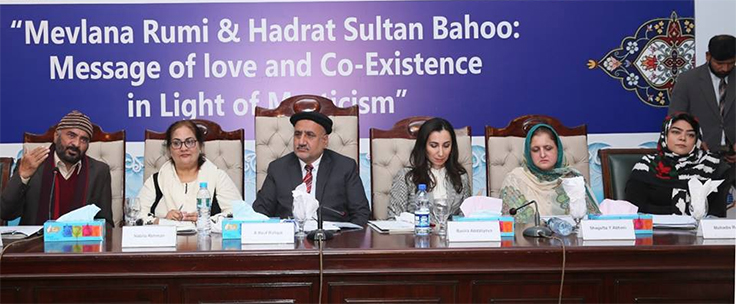
(From left) Prof. Dr. Khaliq Dad Malik, Professor Dr. Nabila Rehman, Dr. Abdul Rauf Rafiqui, Dr. Basira Aziz Aliyeva, Dr. Shagufta Yaseen Abbasi, Dr. Mohaddeseh Al Sadat Rezai
|
|
There is great significance of studying and advocating the Sufi teachings of genius personalities, thinkers and poets like Mevlana Rumi and Haḍrat Sultan Bahoo. Mevlana’s works such as “Masnavi” consisting of 25000 verses, “Divani-Kabir” comprised of 70000 verses, “Rubaiyat”, which is a collection of his rubais, “Majalis-i Saba” and “Fihi Ma Fihi” consisting of conversations by Mevlana have very deep influence on many contemporary Eastern and Western writers. The reason why Mevlana is welcomed, loved and has followers across the globe is related to his philosophical and mystical contributions. His thoughts such as “Do not despair of the mercy of Allah (ﷻ)” which have their root in Al Quran al Kareem were expressed like “Do not follow the direction leading to despair; there is always hope. Do not go to darkness; there is the Sun”, so these ideas could conquer hearts regardless of one’s race, creed or color.
Haḍrat Sultan Bahoo is author of 140 books and large number of poems expressing decency and soul nurturing. He dedicated his whole life to the propagation of divine truth. His sole aim was to equip people and society in gaining wisdom, deepening unity and solidarity with the help of nurturing soul through his works. There are many points in Haḍrat Sultan Bahoo’s creative works that are identical with Rumi’s immortal thoughts. We observe that the thoughts expressed in Haḍrat Sultan Bahoo’s Punjabi “Abyat” are very much similar to the ideas presented by Mevlana in his “Masnavi”. Features which are important for a human being such as spiritual beauty, purity of soul and courtesy unite Haḍrat Sultan Bahoo and Mevlana Rumi. As spiritual wisdom leads human beings towards Allah (ﷻ), Mevlana and Haḍrat Sultan Bahoo consider love as peak of morality. Another similarity between the two Sufi saints is endorsements of the fact that the pain inflicted on the lover in the quest of the love of Allah (ﷻ) is the real beauty of life.
|
|
|
Both personalities conveyed Allah’s (ﷻ) words to people and expressed divine truth. As Mevlana said: “Say nicely, so people can read it for many centuries. The fabric weaved by Allah (ﷻ) would never get old”. Mevlana Rumi and Haḍrat Sultan Bahoo invited humanity towards unity, solidarity and having love for and fear of Allah (ﷻ) in their hearts. As Mevlana said: “Not those who speak the same language, but those who share the same feelings can agree”. Mevlana Rumi and Haḍrat Sultan Bahoo placed a great value on the spiritual training of a human being, and assessed him as a mirror of beauties created by Allah (ﷻ). Mevlana said: “Hey human being, a copy of Allah’s (ﷻ) book! You are a mirror of Allah’s (ﷻ) beauty creating the universe!”.
In this era of technological advancement, we do not lack in the possession of knowledge but in practicing this knowledge. This is the sole reason why this knowledge is not enlightening one’s character and society. In Islamic mysticism, knowledge is classified as Ilm-e-Ẓāhir1 and Ilm-e-Batin2. Ilm-e-Ẓāhir is sufficient for the satisfaction of materialistic needs while Ilm-e-Batin is the true knowledge which illuminates the inner self of humans. Haḍrat Sultan Bahoo considers Ilm-e-Ẓāhir, the initial stage and designates inherent knowledge the climax of real destination. While Mevlana Rumi states that the knowledge which guides towards the real goal is the actual knowledge. Haḍrat Sultan Bahoo mentions that; “So, what is knowledge? In reality, knowledge is a path which leads you towards Allah (ﷻ).”
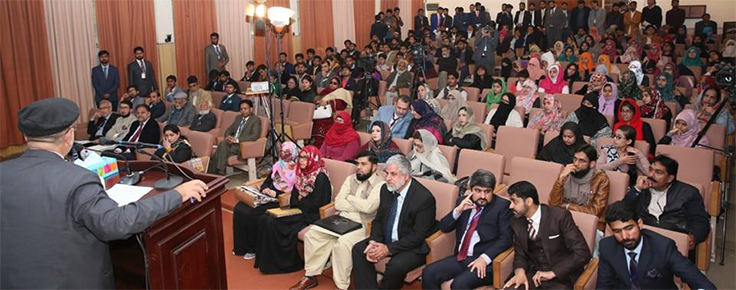
Participants view during the third session of conference.
|
|
|
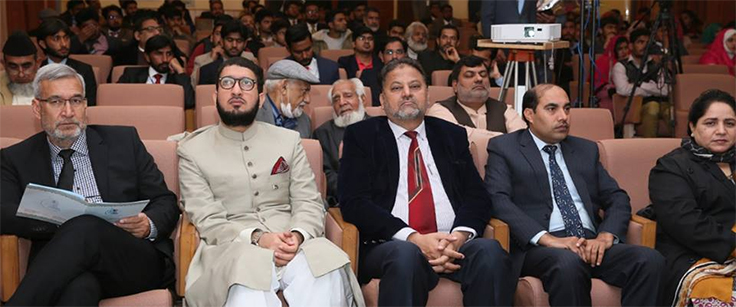
|
|
Whenever Muslims suffered downfall, all the transforming institutions got paralyzed. Only one institution remained steadfast with its full potential, distinct ideology and challenged it, that very institution was the Sufi institution and even the orientalists have accepted the vitality of this institution. Prof. H.A.R Gibbs said in his address at Oxford University that we have seen at multiple occasions in the history of Islam that Islamic culture was attacked with great force but all such attempts doomed to fail in the wake of spiritual insight provided by Sufi shrines in order to curb emerging challenges.
|
|
Interactive Session
|
|

Participants asking questions in interactive session of the conference.
|
|
Breif summary of discussion of the expert panelists during interactive session is observed as under:
Khanqah3 is characterized by Mosque and the religious seminary. In past, mosques and seminaries were essential components of a khanqah where modern education was also imparted along with the conventional religious teachings. For example, in Jamia Nazamia of Baghdad, both religious as well as worldly educations were delivered and it was the hub of scientists, engineers and religious scholars without any discrimination. Students of these seminaries played an important role in the development of their respective societies. It is the way of Sufis that they mingle up with commons and adopt their style. While judging the public mood, a Sufi brings the positive change in a society through his strong ethical and moral character. However, in addition to making pace with society, they always follow the orders of Allah (ﷻ) and the Holy Prophet (ﷺ). Keeping in view the need of time and society, Sufis not only worked for the eradication of social evils but also raised their voice against oppression and a tyrant rule.
|
|
Fourth Academic Session
|
|
|
Fourth academic Session of the conference was chaired by Prof. Dr. Syed Muhammad Akram (Chairman, Dept. of Iqbal Studies, University of the Punjab, Lahore). Prof. Mehr Sohrab Maryam (Persian Dept., Khayam University, Mashad, Iran), Prof. Dr. Muhammad Iqbal Shahid (Chairperson Dept. of Persian, Government College University, Lahore), Mr. Mansoor Afaq (Poet & Columnist) and Dr. Asmat Naz (Dean Faculty of Economics Commerce & Management Sciences, The Women University, Multan) presented their research papers and shared their views in the session. Prof. Dr. Zahid Munir Khan Amir (Chairman, Dept. of Urdu, Punjab University) moderated the proceedings of the session.
Brief summary of remarks presented by speakers is as follows:
|
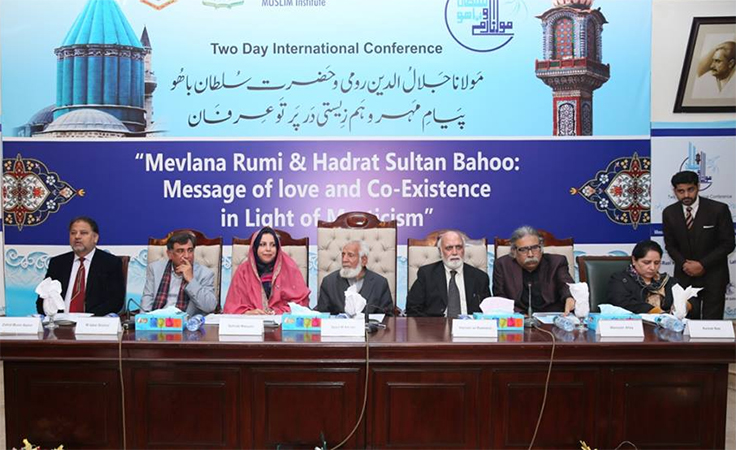
(From left) Prof. Dr. Zahid Munir Khan Amir, Prof. Dr. Muhammad Iqbal Shahid, Prof. Mehr Sohrab Maryam, Prof. Dr. Syed Muhammad Akram, Mr. Harood ur Rasheed, Mr. Mansoor Afaq and Dr Asmat Naz
|
|
In one of his poems from Javaidnama, Iqbal narrates that why we need to study Mevlana Rumi? While answering the question that why you need to follow Rumi as your mūrshid4? Iqbal narrates, Rumi knows the reality. Rumi knows the way of the God. If you want to attain the love of God, you have to regard Rumi as your mūrshid. Iqbal directs us towards Rumi and Rumi guides us towards the Holy Quran.
When Mevalana talks about his mūrshid, he feels overwhelmed and says:
I am overwhelmed in your love, I will never be leaving your company even for a while.
Similarly, Haḍrat Sultan Bahoo mentions about the mūrshid in his poetic work:
My whole body be an eye; I will never be satisfied in beholding my mūrshid - Hoo,
Every bit of me be millions of eyes, I would constantly view my mūrshid, by closing one and opening another - Hoo
The need and the significance of the guidance by the mūrshid is very essential and also the need of the hour. Because when it is said that:
Was it book-lesson, or father’s glance, that taught
The son of Abraham what son should bear?
Allah (ﷻ) sent Prophets in order to manifest ultimate reality and bestowed the books similarly after the finality of Prophet-hood, companions of last Prophet (ﷺ) and then Sufis were the people who relinquished the thirst of burning souls and became the hope of dying hearts.
|
|
|
“Delve into your soul and there seek our life’s buried tracks;”
What is meant by delving into ‘your’ soul? It means that one should purify and cleanse his innermost. When one gets that purification, all the teachings of these personalities would come inside his heart through reflection. As Iqbal has said that “these are the people who keep “Yadey Baiza” in their sleeves, these are those people who hold such treasures which could not be found with Kings but could be found with these personalities, either that is Mevlana Rumi, Bāyazīd Bisṭāmī or Bahauddin Zakariya, Farid Ganjshakar or Alī al-Hujwīrī. The bounty of all these personalities is flowing for everyone and their massage is love, their doors are not closed for anyone.
Sufis disseminated similar message that we should teach our children to become an eagle and should create for them a separate world where they don’t have these uncertain conditions and hopelessness wandering around them. If we want to make our inner self like a diamond then we have to develop tolerance, brotherhood, forgiveness, as seed bears the darkness and weight of soil to become a sapling. Lot of education has been done, lot many degrees have been distributed, lot many research papers have been written meaning there is abundance of knowledge but good upbringing is lacking and is needed the most.
Haḍrat Sultan Bahoo is not merely the name of an individual but a living example of a spiritual movement, which struggles to purge the society with the blessings of the remembrance of Ism-e-Allah Zaat5. It purifies an individual soul from prevailing temptations. Haḍrat Sultan Bahoo knows the secrets of the court of Prophet (ﷺ), hence escort his followers in the right direction.
|
|
|
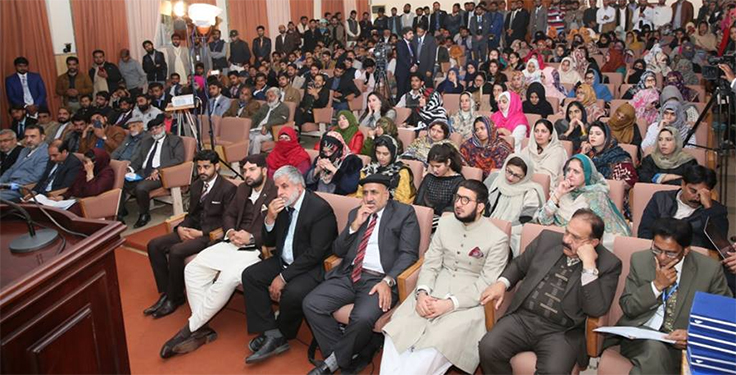
Participants view during the conference.
|
|
Concluding Session
|
|
|
Concluding Session of the conference was chaired by Prof. Dr. Muhammad Fakhar-ul-Haq Noori (Dept. of Urdu, University of the Punjab). Mr. Haroon-ur-Rasheed (Renowned Columnist & Analyst) was Chief Guest on the occasion. Sahibzada Sultan Ahmad Ali (Chairman MUSLIM Institute) presented closing remarks whereas Prof. Dr. Saleem Mazhar (Dean College of Oriental Learning, Punjab University) delivered vote of thanks. Dr Faleeha Kazmi (HoD Persian, LCWU) moderated the proceedings of the concluding session.
Brief summary of remarks presented by speakers is as follows:
|
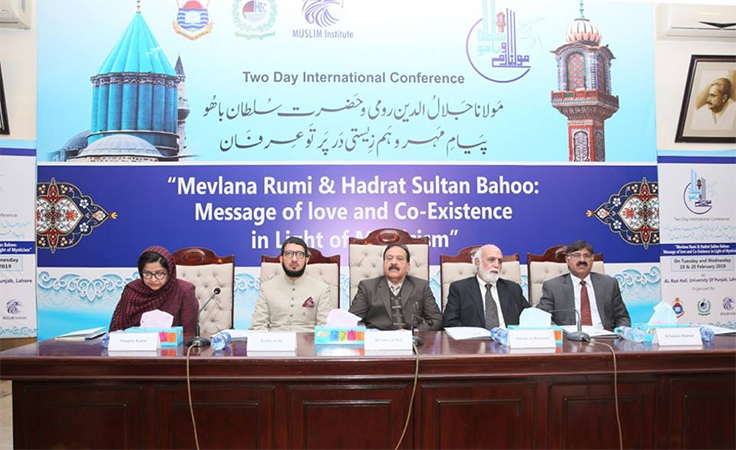
(From left) Dr Faleeha Kazmi, Sahibzada Sultan Ahmad Ali, Prof. Dr. Muhammad Fakhar-ul-Haq Noori, Mr. Haroon-ur-Rasheed, Prof. Dr. Saleem Mazhar
|
|
Sufi adopts the path of Ishq which is difficult and encompasses both the material as well as spiritual obligations. It is the reason – as Allama Iqbal described - that there is a great difference between the call of a conventional Mullah and a practitioner Sufi. Sufi adopts the universal method of preaching religion which was adopted by prophets. Sufi, by dint of his spiritual experience guides people in a universal manner. He advises people to stay connected with the emerging nature in order to shun restlessness. Haḍrat Data Ganj Baksh Usman Bin Ali Hajveri narrates that once he was present in the court of his spiritual mentor, his mentor said that this temporary world is of one day and we have decided to fast for that day.
Despite a lapse of more than three hundred years, the similarity of thought between Mevlana Rumi and Haḍrat Sultan Bahoo is enough to make one wonder. Both struggled for the reformation of societies through spiritual purgation. Literature produced by both the Sufi saints is of great importance for a tālib6. It has been a constant source of inspiration for humanity. Persian literature of Haḍrat Sultan Bahoo and Mevlana is rich in knowledge, wisdom and guidance even for a lay man.
|
|
|
The towering personalities of Mevlana Rumi and Haḍrat Sultan Bahoo laid great emphasis over the transformation of a society while practicing knowledge and discouraging the merely accumulation of knowledge. We should acquaint our younger generation with the works of these saints. It will help a great deal in sowing the seed of love and faith among our coming generations. The earnestness of the message of such Sufis has increased manifold in the wake of prevailing materialism. In order to shun materialism, it has become inevitable to pay special attention to the ideas, training and techniques propagated by Mevlana and Haḍrat Sultan Bahoo. The presence of Sikh community in this august conference is a matter of pride. They will be carrying back this sacred mission with them. The young students participating in this conference need to carry forward this universal message as soon as they commence their practical life.
All the translated works of Mevlana Rumi are playing a very positive role in the transformation of various societies across the globe. More translations are needed to cover more nationalities. In this respect, people from various communities will get a chance to interact with Sufi teachings. Mevlana Rumi says that there is nothing in this world that you can achieve without pursuing it. One needs demand, probe and journey to achieve something. You cannot imagine finding him (beloved) unless you struggle for him. One needs not physical map to find this treasure but Divine help (Taufeeq). It is Divine help (Taufeeq) that enables all of us to gather in this spiritual gathering.
|
|
|
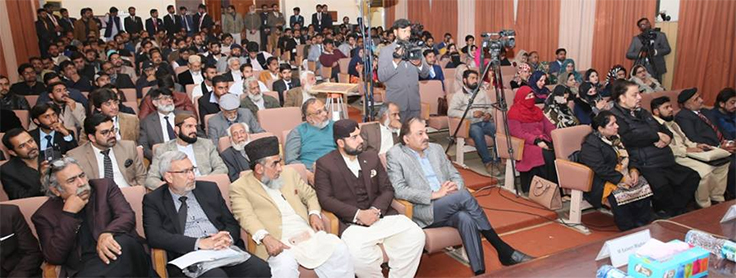
Participants view during the conference.
|
|
The objective of the conference was to convey the audience that how the Sufi teachings used to rebuild a society. The topics of the conference covered the concept of coexistence and the ways that how it can be achieved. Sufis tried to create a sense of brotherhood, peace, sacrifice, patience, love, respect, morality, tolerance and other such values which are also the great teachings preached by world religions especially that of taught by Prophet Muhammad (ﷺ). The Holy Qurʾān also guides about it. These are the great values which Holy Prophet (ﷺ) not only practiced himself but also preached to others. These values are inextricably linked to Sufism. Iqbal admired the balanced approach adopted by Sufism. Iqbal wants that these values should be evident in the social training of a seminary, a shrine caretaker or at governmental level. Therefore, coexistence is the sine qua non for a society to survive and flourish.
|
Notes
1. Formal education which is taught in schools etc.
2. Knowledge relating to spirituality and their practices
3. Monastery of a Sufi
4. Mūrshid: مرشد Sufi master, a true mūrshid is only that person who is bestowed the state of mūrshid by the court of Rasool Allah (ﷺ)
5. Ism-e-Allah Zaat: اسم اللہ ذات Actual name of Allah Almighty (ﷻ)
6. Dervīsh in quest of recognition of Allah Almighty (ﷻ), the desirous for Allah Almighty (ﷻ)
|
| |
|
|
|
|
|
| |
|